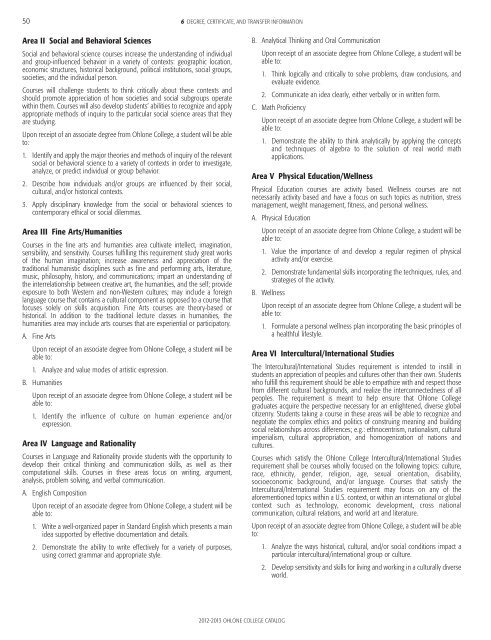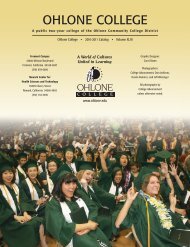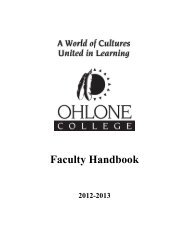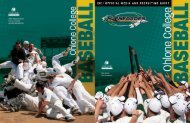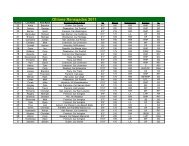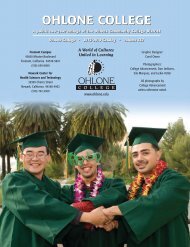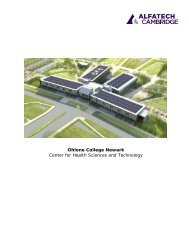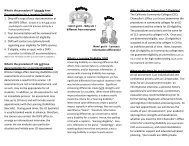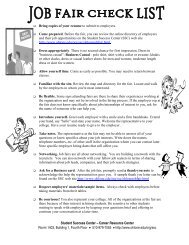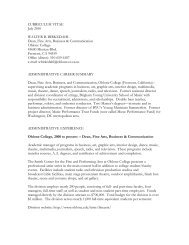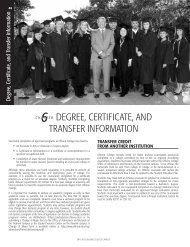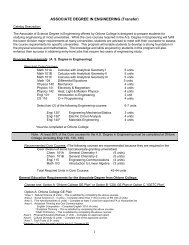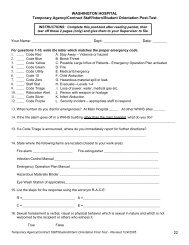2012-2013 Catalog (all pages) - Ohlone College
2012-2013 Catalog (all pages) - Ohlone College
2012-2013 Catalog (all pages) - Ohlone College
Create successful ePaper yourself
Turn your PDF publications into a flip-book with our unique Google optimized e-Paper software.
50 6 DEGREE, CERTIFICATE, AND TRANSFER INFORMATION<br />
Area II Social and Behavioral Sciences<br />
Social and behavioral science courses increase the understanding of individual<br />
and group-influenced behavior in a variety of contexts: geographic location,<br />
economic structures, historical background, political institutions, social groups,<br />
societies, and the individual person.<br />
Courses will ch<strong>all</strong>enge students to think critic<strong>all</strong>y about these contexts and<br />
should promote appreciation of how societies and social subgroups operate<br />
within them. Courses will also develop students’ abilities to recognize and apply<br />
appropriate methods of inquiry to the particular social science areas that they<br />
are studying.<br />
Upon receipt of an associate degree from <strong>Ohlone</strong> <strong>College</strong>, a student will be able<br />
to:<br />
1. Identify and apply the major theories and methods of inquiry of the relevant<br />
social or behavioral science to a variety of contexts in order to investigate,<br />
analyze, or predict individual or group behavior.<br />
2. Describe how individuals and/or groups are influenced by their social,<br />
cultural, and/or historical contexts.<br />
3. Apply disciplinary knowledge from the social or behavioral sciences to<br />
contemporary ethical or social dilemmas.<br />
Area III Fine Arts/Humanities<br />
Courses in the fine arts and humanities area cultivate intellect, imagination,<br />
sensibility, and sensitivity. Courses fulfilling this requirement study great works<br />
of the human imagination; increase awareness and appreciation of the<br />
traditional humanistic disciplines such as fine and performing arts, literature,<br />
music, philosophy, history, and communications; impart an understanding of<br />
the interrelationship between creative art, the humanities, and the self; provide<br />
exposure to both Western and non-Western cultures; may include a foreign<br />
language course that contains a cultural component as opposed to a course that<br />
focuses solely on skills acquisition. Fine Arts courses are theory-based or<br />
historical. In addition to the traditional lecture classes in humanities, the<br />
humanities area may include arts courses that are experiential or participatory.<br />
A. Fine Arts<br />
Upon receipt of an associate degree from <strong>Ohlone</strong> <strong>College</strong>, a student will be<br />
able to:<br />
1. Analyze and value modes of artistic expression.<br />
B. Humanities<br />
Upon receipt of an associate degree from <strong>Ohlone</strong> <strong>College</strong>, a student will be<br />
able to:<br />
1. Identify the influence of culture on human experience and/or<br />
expression.<br />
Area IV Language and Rationality<br />
Courses in Language and Rationality provide students with the opportunity to<br />
develop their critical thinking and communication skills, as well as their<br />
computational skills. Courses in these areas focus on writing, argument,<br />
analysis, problem solving, and verbal communication.<br />
A. English Composition<br />
Upon receipt of an associate degree from <strong>Ohlone</strong> <strong>College</strong>, a student will be<br />
able to:<br />
1. Write a well-organized paper in Standard English which presents a main<br />
idea supported by effective documentation and details.<br />
2. Demonstrate the ability to write effectively for a variety of purposes,<br />
using correct grammar and appropriate style.<br />
B. Analytical Thinking and Oral Communication<br />
Upon receipt of an associate degree from <strong>Ohlone</strong> <strong>College</strong>, a student will be<br />
able to:<br />
1. Think logic<strong>all</strong>y and critic<strong>all</strong>y to solve problems, draw conclusions, and<br />
evaluate evidence.<br />
2. Communicate an idea clearly, either verb<strong>all</strong>y or in written form.<br />
C. Math Proficiency<br />
Upon receipt of an associate degree from <strong>Ohlone</strong> <strong>College</strong>, a student will be<br />
able to:<br />
1. Demonstrate the ability to think analytic<strong>all</strong>y by applying the concepts<br />
and techniques of algebra to the solution of real world math<br />
applications.<br />
Area V Physical Education/Wellness<br />
Physical Education courses are activity based. Wellness courses are not<br />
necessarily activity based and have a focus on such topics as nutrition, stress<br />
management, weight management, fitness, and personal wellness.<br />
A. Physical Education<br />
Upon receipt of an associate degree from <strong>Ohlone</strong> <strong>College</strong>, a student will be<br />
able to:<br />
1. Value the importance of and develop a regular regimen of physical<br />
activity and/or exercise.<br />
2. Demonstrate fundamental skills incorporating the techniques, rules, and<br />
strategies of the activity.<br />
B. Wellness<br />
Upon receipt of an associate degree from <strong>Ohlone</strong> <strong>College</strong>, a student will be<br />
able to:<br />
1. Formulate a personal wellness plan incorporating the basic principles of<br />
a healthful lifestyle.<br />
Area VI Intercultural/International Studies<br />
The Intercultural/International Studies requirement is intended to instill in<br />
students an appreciation of peoples and cultures other than their own. Students<br />
who fulfill this requirement should be able to empathize with and respect those<br />
from different cultural backgrounds, and realize the interconnectedness of <strong>all</strong><br />
peoples. The requirement is meant to help ensure that <strong>Ohlone</strong> <strong>College</strong><br />
graduates acquire the perspective necessary for an enlightened, diverse global<br />
citizenry. Students taking a course in these areas will be able to recognize and<br />
negotiate the complex ethics and politics of construing meaning and building<br />
social relationships across differences; e.g.: ethnocentrism, nationalism, cultural<br />
imperialism, cultural appropriation, and homogenization of nations and<br />
cultures.<br />
Courses which satisfy the <strong>Ohlone</strong> <strong>College</strong> Intercultural/International Studies<br />
requirement sh<strong>all</strong> be courses wholly focused on the following topics: culture,<br />
race, ethnicity, gender, religion, age, sexual orientation, disability,<br />
socioeconomic background, and/or language. Courses that satisfy the<br />
Intercultural/International Studies requirement may focus on any of the<br />
aforementioned topics within a U.S. context, or within an international or global<br />
context such as technology, economic development, cross national<br />
communication, cultural relations, and world art and literature.<br />
Upon receipt of an associate degree from <strong>Ohlone</strong> <strong>College</strong>, a student will be able<br />
to:<br />
1. Analyze the ways historical, cultural, and/or social conditions impact a<br />
particular intercultural/international group or culture.<br />
2. Develop sensitivity and skills for living and working in a cultur<strong>all</strong>y diverse<br />
world.<br />
<strong>2012</strong>-<strong>2013</strong> OHLONE COLLEGE CATALOG


